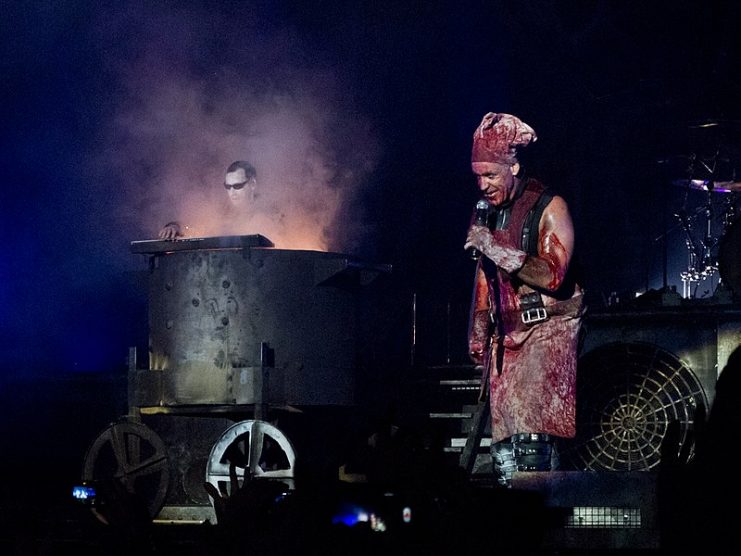A statement released by the band claimed that they were merely depicting a period in the nation’s history.
Popular musicians in every known genre – rock, heavy metal, even folk – have pulled plenty of wild stunts for publicity. Ozzy Osbourne, when he was lead singer of the heavy metal band Black Sabbath, once bit the head from a dead bat while in concert in Des Moines in January of 1982. For his trouble, he spent the ensuing hours after the concert receiving painful rabies shots.
But the publicity generated by his actions was likely priceless. Even today, footage online shows the stunt, and has kept the band’s name relevant in their genre long since they stopped touring. It wasn’t Osbourne’s first animal stunt, either – he once bit the head off a live dove in a meeting with studio executives in Los Angeles in 1981, just to make a point.
A band in Germany, however, appears to have tested the limits of even the most accepting of audiences and critics. The band, Rammstein (which translates in English as “Ramming Stone”), has released a music video for the song “Deutschland” that is staged in a mock concentration camp, and it has brought ire not only from viewers at home, but also from critics in Israel.


The band’s individual members are costumed as camp prisoners, and at least one wears a Star of David, the symbol Jews were forced to wear by their Nazi tormentors. In one scene during the nine-minute video, several band members are shown wearing nooses. Elsewhere, some of the cast are seen murdering SS guards by shooting them in the head.
A statement released by the band claimed that they were merely depicting a period in the nation’s history.
This is not the first time Rammstein has courted controversy by referencing this particularly painful era in Germany’s past. They also referenced the Nazi regime in a 1998 video that used clips from the sports film Olympia.
Considered as propaganda, Olympia was directed by Leni Riefenstahl, the documentary filmmaker who also made Triumph Of The Will for Josef Goebbels, propaganda minister of the Nazi party.
Why the band would pick at a scab over Germany’s national soul, to say nothing of the hurt and painful memories for Jews around the globe, is unclear. But the band has used controversial material other than the era of the Nazi regime as well, seemingly to provoke publicity and burnish sales figures. The band has used images of sadomasochism, violence against women, and even necrophilia in their work.
The content in their album “Für Alle Da” (“Love Is For All”) in 2009 was “deemed harmful” to tender viewers, including children, and consequently the album was banned from display in retail outlets. One of the album’s tracks, “Ich Tu Dir Weh” (“I Want To Hurt You”) was considered especially egregious.
Criticism of Rammstein’s most recent “Deutschland” video poured in immediately, most notably from Israel. Emmanuel Nahshon, spokesman for the Israeli Foreign Minister, tweeted on March 28: “This Rammstein clip, using the Holocaust for advertising purposes, is shameful and uncalled for. We join the many voices calling for its immediate removal.”
The video has received plenty of pushback at home, too. Felix Klein, Germany’s anti-Semitism commissioner, responded to the controversy by saying that if the band created the video just to boost sales, it was “a tasteless exploitation of artistic freedom.”
There was the occasional defender of the video who voiced their support on social media, however. One person said the band could not be faulted for using a scenario that was accurate, however distasteful it might be. “It’s definitely calling [us] out for learning from past mistakes,” the individual tweeted.
Perhaps. But Germans don’t, overall, need reminding of that horrific chapter in their nation’s history. When weighing that reminder against the pain, hurt and suffering the Nazi regime caused for so many, which side of the debate carries more weight? Clearly, that of the victims, who do not wish to see the abuse they endured used as a backdrop for entertainment.


Leave a Comment